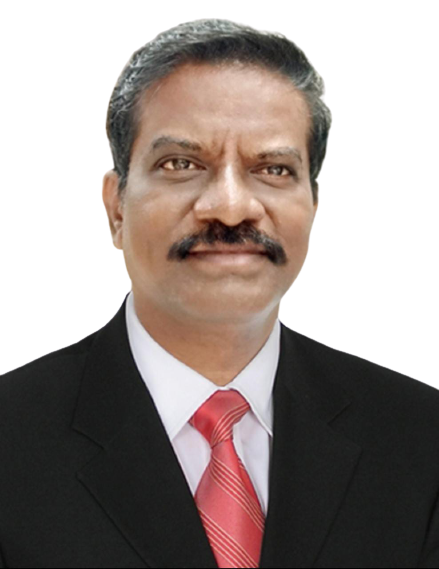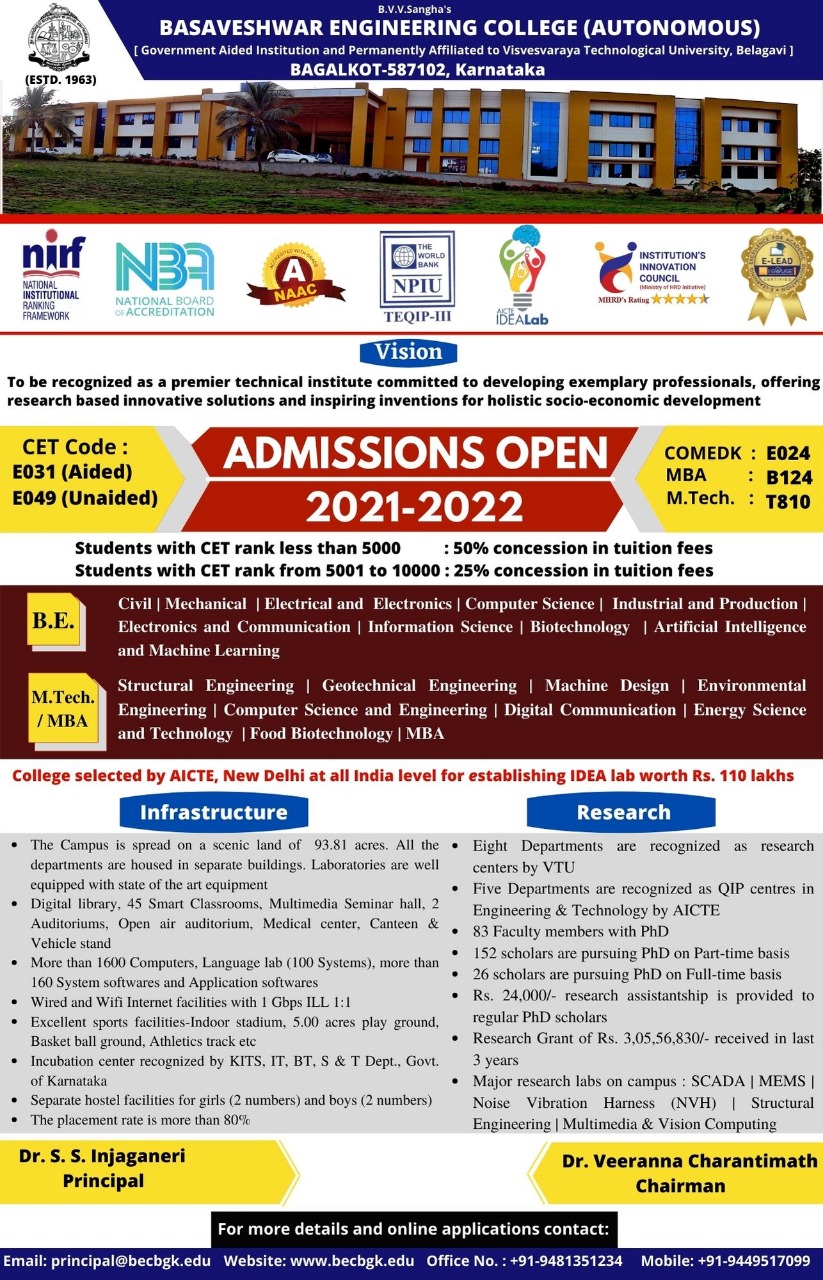Electronics and Computer Engineering
Electronics and Computer Engineering is a dynamic field that combines electronics engineering and computer science to design, develop, and integrate innovative technologies. Bachelor of Engineering (B. E.) programme in Electronics and Computer Engineering is designed to provide quality education imparting skills in both electronic hardware and software, and IT development. It is a cornerstone of modern technology, blending electronic engineering with computer science to drive innovations that shape the world. This interdisciplinary field has become the backbone of the digital age, and its importance continues to grow as technology evolves. The role of ECS engineers is both transformative and indispensable. Electronics and computer engineering is the foundation of the modern technological landscape. By driving innovation, enabling connectivity, and transforming industries, this field has profoundly influenced the society. As the world move towards the digital age, the importance of Electronics and Computer Engineeirng will continue to grow, shaping the future and providing the tools and systems to tackle new global challenges. It is the primary engine powering technological progress, making it a vital and indispensable part of today’s world.
To meet the growing requirements of qualified personal in the vast field, Department of Electronics and Computer Engineering is established in the academic year 2024-25. Currently the department offers an under-graduate programme (B. E.) in Electronics and Computer Engineering with an intake of 60 students. The department has highest qualified and well experienced faculty members. The average teaching experience of faculty is 27 years and the faculty members are committed to impart quality technical education in the field of Electronics and Computer Engineering as well as research. The department is housed in a spacious and new building consisting of well equipped laboratories, IoT and computer laboratories with more than 60 computers, faculty rooms and department office. The department is equipped with pervasive and high quality wired and Wi-Fi networks.
Primary aim of the department is to impart engineering education that fulfills the requirements of the society, industry and research, developing professionals with ethical values and societal concern. As the graduates from this branch are well suited for both electrical, electronic industries as well as software companies, the job opportunity and career growth is profoundly more.
To meet the growing requirements of qualified personal in the vast field, Department of Electronics and Computer Engineering is established in the academic year 2024-25. Currently the department offers an under-graduate programme (B. E.) in Electronics and Computer Engineering with an intake of 60 students. The department has highest qualified and well experienced faculty members. The average teaching experience of faculty is 27 years and the faculty members are committed to impart quality technical education in the field of Electronics and Computer Engineering as well as research. The department is housed in a spacious and new building consisting of well equipped laboratories, IoT and computer laboratories with more than 60 computers, faculty rooms and department office. The department is equipped with pervasive and high quality wired and Wi-Fi networks.
Primary aim of the department is to impart engineering education that fulfills the requirements of the society, industry and research, developing professionals with ethical values and societal concern. As the graduates from this branch are well suited for both electrical, electronic industries as well as software companies, the job opportunity and career growth is profoundly more.
To be a recognized leader in Instrumentation discipline by creating a good platform of learning and research with commitments to the socio economic developments.
The Department of Electronics and Computer Engineering at Basaveshwar Engineering College, Bagalkote is recognized for its emphasis on academic excellence, research, and industry collaboration. Here are some of the key highlights of the department:
1. Curriculum: • The department offers a well-structured curriculum that balances foundational courses in electronics and computer engineering with modern advancements in areas like embedded systems, communication systems, signal processing, microelectronics, and software development. • The curriculum is continuously updated to align with industry standards and technological advancements.
2. Laboratories: • The department is equipped with modern laboratories that provide students with hands-on experience in areas such as Analog and Digital Electronics, Microprocessors and Microcontrollers, Embedded Systems, VLSI Design, and Communication Systems. • Labs are well-equipped with industry-standard tools and simulation software to support practical learning and research.
3. Research and Development: • The department encourages research in cutting-edge fields like IoT (Internet of Things), Robotics, Artificial Intelligence, Machine Learning, Embedded Systems, and Wireless Communications. • Faculty members actively participate in research projects and publications in reputed journals and conferences. • The department also collaborates with research organizations and industries to provide students with research opportunities.
4. Industry Partnerships and Collaboration: • The department has strong industry links, offering students exposure to the latest trends and practices through industrial visits, internships, and guest lectures by experts from leading companies in the electronics and computer engineering sectors. • Collaborations with tech giants and local industries ensure that the curriculum remains relevant to current industry needs.
5. Skill Development and Training: • The department offers various training programs, workshops, and seminars to enhance student skills in both theoretical knowledge and practical application. • Special focus is given to programming languages (such as C, C++, Python), embedded systems, hardware design, and advanced software tools that are in high demand in the industry.
6. Project-Based Learning: • Students are encouraged to work on real-time projects in various domains, which foster problem-solving, innovation, and hands-on experience. These projects can range from designing circuits to developing software and hardware systems. • The department also supports students in presenting their projects at technical festivals, conferences, and competitions.
7. Student Association and Activities: • The department has active student association, O-TEC, which organize workshops, hackathons, technical competitions, and guest lectures. • This student association provides a platform for students to explore their interests, enhance leadership skills, and collaborate on innovative projects.
8. Placement Assistance and Career Development: • The department has a vision of creating an excellent placement record with students securing positions in top companies in sectors such as electronics, software, telecommunications, and IT. • The college’s Placement and Training Cell offers counseling, interview preparation, soft skills workshops, and other resources to help students prepare for the job market.
9. Experienced and Qualified Faculty: • The department boasts a dedicated and experienced faculty team with strong academic and professional backgrounds in electronics, computer science, and engineering. • Faculty members are actively involved in academic research and industry collaboration, and they guide students in their academic and career development.
10. Infrastructure: • Basaveshwar Engineering College provides a well-equipped campus with modern classrooms, seminar halls, and a digital library. • The Electronics and Computer Engineering department benefits from spacious, well-maintained labs and high-speed internet connectivity, creating an ideal environment for both learning and research.
11. Innovation and Entrepreneurship: • The department encourages students to explore entrepreneurial opportunities, particularly in the fields of electronics, computer engineering, and embedded systems. • Students are encouraged to participate in startup initiatives, tech festivals, and innovation challenges, supported by the college’s incubation center.
12. Accreditation and Recognition: • The Electronics and Computer Engineering department is affiliated with Visvesvaraya Technological University (VTU) and is recognized for maintaining high academic and technical standards. • The department has a good reputation in the region for producing quality engineers who excel in both higher studies and industry careers.
These features make the Department of Electronics and Computer Engineering at Basaveshwar Engineering College (BEC), Bagalkote an attractive choice for students pursuing a career in electronics, computer engineering, and related fields. The focus on practical learning, research, and industry partnerships ensures that graduates are well-prepared for future challenges in the technology sector.
1. Curriculum: • The department offers a well-structured curriculum that balances foundational courses in electronics and computer engineering with modern advancements in areas like embedded systems, communication systems, signal processing, microelectronics, and software development. • The curriculum is continuously updated to align with industry standards and technological advancements.
2. Laboratories: • The department is equipped with modern laboratories that provide students with hands-on experience in areas such as Analog and Digital Electronics, Microprocessors and Microcontrollers, Embedded Systems, VLSI Design, and Communication Systems. • Labs are well-equipped with industry-standard tools and simulation software to support practical learning and research.
3. Research and Development: • The department encourages research in cutting-edge fields like IoT (Internet of Things), Robotics, Artificial Intelligence, Machine Learning, Embedded Systems, and Wireless Communications. • Faculty members actively participate in research projects and publications in reputed journals and conferences. • The department also collaborates with research organizations and industries to provide students with research opportunities.
4. Industry Partnerships and Collaboration: • The department has strong industry links, offering students exposure to the latest trends and practices through industrial visits, internships, and guest lectures by experts from leading companies in the electronics and computer engineering sectors. • Collaborations with tech giants and local industries ensure that the curriculum remains relevant to current industry needs.
5. Skill Development and Training: • The department offers various training programs, workshops, and seminars to enhance student skills in both theoretical knowledge and practical application. • Special focus is given to programming languages (such as C, C++, Python), embedded systems, hardware design, and advanced software tools that are in high demand in the industry.
6. Project-Based Learning: • Students are encouraged to work on real-time projects in various domains, which foster problem-solving, innovation, and hands-on experience. These projects can range from designing circuits to developing software and hardware systems. • The department also supports students in presenting their projects at technical festivals, conferences, and competitions.
7. Student Association and Activities: • The department has active student association, O-TEC, which organize workshops, hackathons, technical competitions, and guest lectures. • This student association provides a platform for students to explore their interests, enhance leadership skills, and collaborate on innovative projects.
8. Placement Assistance and Career Development: • The department has a vision of creating an excellent placement record with students securing positions in top companies in sectors such as electronics, software, telecommunications, and IT. • The college’s Placement and Training Cell offers counseling, interview preparation, soft skills workshops, and other resources to help students prepare for the job market.
9. Experienced and Qualified Faculty: • The department boasts a dedicated and experienced faculty team with strong academic and professional backgrounds in electronics, computer science, and engineering. • Faculty members are actively involved in academic research and industry collaboration, and they guide students in their academic and career development.
10. Infrastructure: • Basaveshwar Engineering College provides a well-equipped campus with modern classrooms, seminar halls, and a digital library. • The Electronics and Computer Engineering department benefits from spacious, well-maintained labs and high-speed internet connectivity, creating an ideal environment for both learning and research.
11. Innovation and Entrepreneurship: • The department encourages students to explore entrepreneurial opportunities, particularly in the fields of electronics, computer engineering, and embedded systems. • Students are encouraged to participate in startup initiatives, tech festivals, and innovation challenges, supported by the college’s incubation center.
12. Accreditation and Recognition: • The Electronics and Computer Engineering department is affiliated with Visvesvaraya Technological University (VTU) and is recognized for maintaining high academic and technical standards. • The department has a good reputation in the region for producing quality engineers who excel in both higher studies and industry careers.
These features make the Department of Electronics and Computer Engineering at Basaveshwar Engineering College (BEC), Bagalkote an attractive choice for students pursuing a career in electronics, computer engineering, and related fields. The focus on practical learning, research, and industry partnerships ensures that graduates are well-prepared for future challenges in the technology sector.
HOD

Dr. C. L. Chayalakshmi
Asso. Professor and HOD




